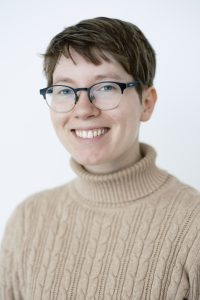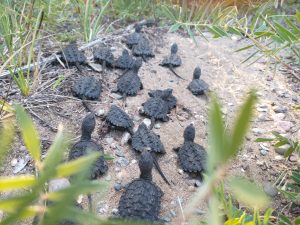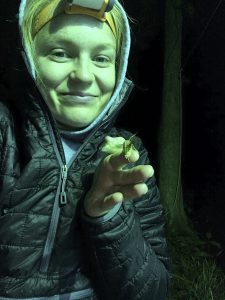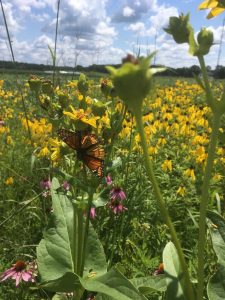Meet the team that will work together this year to develop programs like the KBS K-12 Partnership and collaborate on outreach programming at the Kellogg Bird Sanctuary, MSU and in local communities! The focus of the W.K. Kellogg Biological Station Science Education and Outreach Fellowship is to provide mentorship and opportunities to share science in meaningful ways with K-12 educators, youth and adults. Read on to meet Ayley and Alice and learn about their research and outreach interests.
Ayley Shortridge
 Hi there! My name is Ayley, and I’m a second-year Integrative Biology Ph.D. student in the Janzen Lab at Kellogg Biological Station. I study how changing environmental factors, like heat waves and flash droughts, impact the development and fitness of freshwater turtles. Turtles might seem impervious with their tough shells and long lifespans, but early life stages – eggs and hatchlings – are more vulnerable than you might think. My favorite part of my job is hatching baby turtles in the lab and releasing them safely back into the wild!
Hi there! My name is Ayley, and I’m a second-year Integrative Biology Ph.D. student in the Janzen Lab at Kellogg Biological Station. I study how changing environmental factors, like heat waves and flash droughts, impact the development and fitness of freshwater turtles. Turtles might seem impervious with their tough shells and long lifespans, but early life stages – eggs and hatchlings – are more vulnerable than you might think. My favorite part of my job is hatching baby turtles in the lab and releasing them safely back into the wild!
How did I end up here? I’ve been in love with science all my life, and I count myself very fortunate for the guidance of teachers and mentors who inspired me to pursue this career path. After earning my undergraduate degree in zoology, I spent a summer as a field technician with the Michigan Natural Features Inventory, surveying Blanding’s turtle populations in Michigan. My interest in turtle ecology led me to the Janzen Lab, where I decided to pursue grad school!

In the first year of my Ph.D. program, I led two biology labs on campus as a teaching assistant. I was also a co-presenter at the MSU Science Festival, where I shared my love for turtles with an audience of all ages. I believe that science education and outreach are essential to raise public awareness and build the foundations for the next generation of scientists. In my free time, I enjoy writing, art, hiking in the woods, and spending time with my cat, Max.
What’s next? I’m looking forward to making new connections, learning and growing this year as a science education and outreach fellow. In our changing world, it’s more important than ever to work together to bring cutting-edge science to our communities. I’m excited to help develop workshops and events, create science writing and art, and shape KBS outreach efforts in the future. Stay tuned for updates!
Alice Puchalsky
 Hi, my name is Alice and I am a fifth-year Ph.D. student in Nick Haddad’s lab at the Kellogg Biological Station. I was a science education and outreach fellow during the spring of 2023, and I am excited to continue on as a fellow for the 2023-24 school year! I study how human activities affect insect biodiversity and the services that insects provide to us. I love studying insects because of their beauty, megadiversity, and all of their strange and interesting ways of living life. Plus, insects are crucial to our ecosystems and they provide us with many benefits including pollination, pest control, and decomposition.
Hi, my name is Alice and I am a fifth-year Ph.D. student in Nick Haddad’s lab at the Kellogg Biological Station. I was a science education and outreach fellow during the spring of 2023, and I am excited to continue on as a fellow for the 2023-24 school year! I study how human activities affect insect biodiversity and the services that insects provide to us. I love studying insects because of their beauty, megadiversity, and all of their strange and interesting ways of living life. Plus, insects are crucial to our ecosystems and they provide us with many benefits including pollination, pest control, and decomposition.
My research: Bees, moths, butterflies and more!

My favorite group of insects are moths, but this summer, I’ve become really interested in bumble bees. One of my favorite bumble bee species is Bombus bimaculatus. In addition to finding them very cute, I am interested in their eusocial life history, which means they live in groups and perform collective brood care. In my research, I have several projects that focus on butterflies, moths, wasps, flies and bees and how they use different landscapes, like habitat corridors and strips of prairie in agricultural fields (i.e., prairie strips).
- Project 1: I am assessing how habitat corridors– which are corridors of habitat that connect two otherwise unconnected patches of habitat– affect moth biodiversity.
- Project 2: I am determining how incorporating prairie strips in a field affects the number and diversity of interactions between caterpillars (which are sometimes crop pests) and their parasitoids. I hope to better understand if introducing prairie strips might boost pest control services by parasitoids and if prairie strips might foster a greater diversity of interactions (interaction diversity is one aspect of biodiversity) between caterpillars and parasitoids.
Past and future outreach experiences
I didn’t always love insects, and various educational and outreach experiences helped me to overcome my fear. I know first-hand how impactful science education and outreach can be, so I am very happy to be able to provide those sorts of experiences for others through this fellowship (check out my ‘mothing from home video tutorial’). This past semester as a fellow, I particularly enjoyed interacting with K-12 students through field trips and classroom visits. During the coming year, I am looking forward to doing more outreach and education work focused on art and science, insects, and in-person field trips at the W.K. Kellogg Bird Sanctuary. If you’re interested in incorporating more insect content into your curriculum, feel free to reach out!
About the fellows program
Science education and outreach fellowships are funded by the MSU Graduate School in order to support KBS-affiliated graduate students in building science communication skills for broad audiences. Misty Klotz, KBS community outreach coordinator, and Kara Haas, KBS LTER K-12 Partnership coordinator, are co-mentors to this experience.
More information
Are you a teacher interested in the K-12 Partnership? Send us an email.
Are you a KBS graduate student interested in this program? Find more information here.

A legacy of conservation; a commitment to sustainability.
3700 E. Gull Lake Drive
Hickory Corners, MI 49060
(269) 671-5117
info@kbs.msu.edu